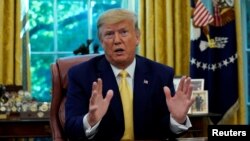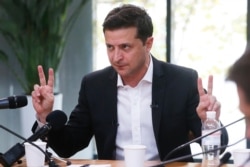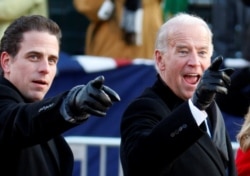As Democrats forge ahead with the impeachment investigation into whether President Donald Trump abused his office by pressing Ukraine for information against his political opponents, some legal scholars say their entire case rests on a faulty understanding of executive power.
In the view of these experts — long-time proponents of a strong presidency — the U.S. Constitution gives the president broad control over all functions of the executive branch, and Congress has no business investigating the president's conversations with world leaders.
The impeachment inquiry centers on a July 25 phone call during which Trump pressed Ukrainian leader Volodymyr Zelenskiy to investigate a conspiracy theory about the 2016 election involving the Democratic National Committee, as well as corruption allegations involving former vice president Joe Biden, and his son, Hunter Biden.
Although Trump says he did nothing wrong during the call, the Democrats see it as an outright case of inviting foreign interference in American politics in violation of federal laws.
Legal proponents of 'robust presidency'
John Yoo, a conservative constitutional scholar at the University of California at Berkeley, says the call lies outside the purview of a Congressional impeachment inquiry, arguing in a recent opinion piece in the New York Times that even a president "who is possibly engaging in wrongdoing" must have confidence in the privacy of his conversations with world leaders. Yoo was deputy assistant attorney general under President George W. Bush, whose administration engineered the biggest expansion of executive power in modern times.
What transpired during Trump's call has been documented so far by a call summary released by the White House, a whistleblower complaint by an intelligence official, sworn testimony by government officials and Trump himself.
Trump, who had held up nearly $400 million in military assistance for Ukraine, repeatedly brought up U.S. aid for the country before asking Zelenskiy for a "favor" to reopen investigations of the Bidens' activities in Ukraine and look into debunked conspiracy theories for use against the Democrats.
Regardless of the propriety of the call, Yoo and other advocates of a robust presidency argue that the president's private conversation should not have come to light in the first place and shouldn't be used against him because of his broad executive powers.
"The president is entitled to have confidential communications with people he seeks advice from, with world leaders," said Harvard law professor Alan Dershowitz, another champion of presidential powers. "The implications of making public presidential calls to world leaders is frightening."
Under the U.S. Constitution, the president enjoys broad latitude in the foreign policy arena. Although Congress is empowered to appropriate funds, declare war, and confirm ambassadors, it cannot direct the president on how to conduct foreign policy. Dershowitz views Trump's phone call falling legitimately within the president's power.
"Ukraine has a history of corruption. It was perfectly reasonable for the president to lecture the Ukrainian president about corruption," Dershowitz said. "Where he, I believe, went over the line politically and perhaps morally but not legally is when he then introduced Hunter Biden into the discussion."
Most Constitutional scholars do not share such an expansive view of presidential authority. Edward Foley, a law professor at Ohio State University, said that Yoo's views are "at one end of the spectrum in terms of how much presidential power must be acknowledged and not be subject to Congress and oversight and review." But these arguments are likely to be part of the president's defense in the event Trump is impeached by the U.S. House of Representatives and stands trial in the U.S. Senate, experts say.
The standard for impeachment
The U.S. Constitution sets a high bar for impeachment, calling for the president's removal for "Treason, Bribery and other High Crimes and Misdemeanors." The phrase "high crimes and misdemeanors" — widely understood to mean abuse of office and breach of public trust — was added to limit impeachment to very serious crimes and misconduct.
Only two American presidents in history — Andrew Johnson and Bill Clinton — have been impeached, though both were acquitted by the Senate. Richard Nixon resigned before the House could act.
Whatever Trump said during his phone conversation with the Ukrainian president may have been inappropriate, but it is not an impeachable offense, Dershowitz insists. "Many presidents use foreign policy as a way of helping them get elected to office or as a way of evening scores with perceived enemies," Dershowitz said.
Foreign help with political rivals
Foley said there are circumstances in which a president can legitimately seek a foreign government's assistance with investigating political rivals.
One opportunity came in 1968 when Democratic President Lyndon Johnson learned that then-Republican presidential candidate Richard Nixon was secretly trying to subvert peace talks to end the Vietnam War to get the upper hand in the election.
While Johnson did not stand for re-election because of the war's unpopularity — vice president Hubert Humphrey ran instead — he could have asked the South Vietnamese government to investigate Nixon even though it would have hurt the Republican nominee.
"But it would have been appropriate because it would have been genuinely in the pursuit of protecting America's national security interests in terms of peace talks with the Vietnam War," Foley said. "It wouldn't have been done purely for an electoral advantage."
In judging whether Trump's Ukraine pressure campaign constitutes grounds for impeachment, what matters is not the words Trump used the during call but the context of the conversation, Foley said.






